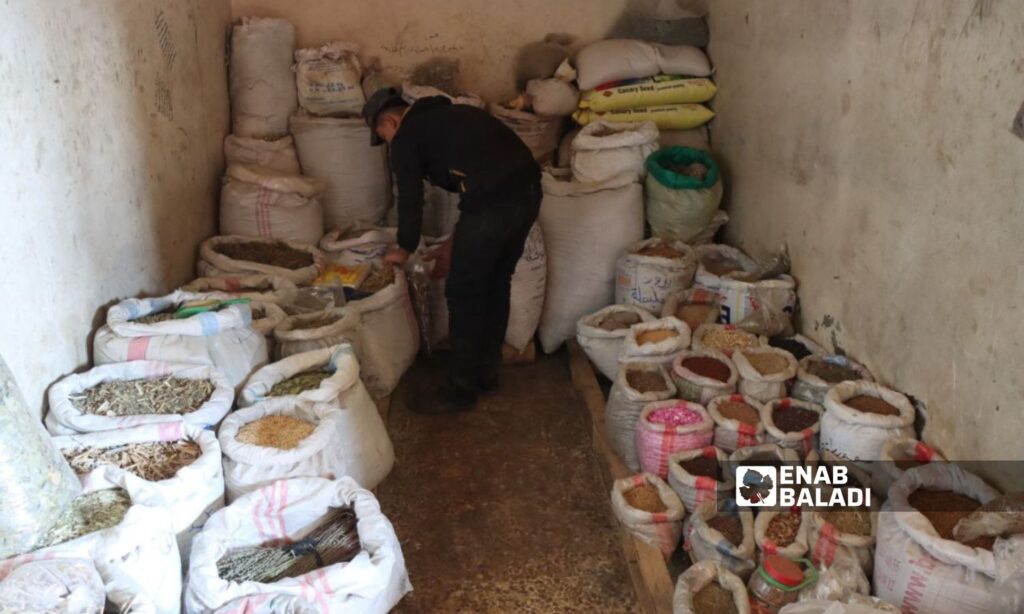Deir Ezzor – Obadah al-Sheikh
Traditional Arabic medicine has long been considered part of the cultural heritage of the eastern provinces in Syria, but reliance on this type of treatment has gradually decreased with the availability of modern medical methods in the area.
A part of the province’s inhabitants still prefers this type of treatment, either as an additional or complementary method to modern treatment ways, while some of them resort to it for economic reasons.
Zainab al-Saleh, from the town of Granij east of Deir Ezzor, frequents the herbal medicine clinic seeking treatment to alleviate the migraine pains she suffers from, especially after losing hope in the effectiveness of traditional pain relievers, as she told Enab Baladi.
She added that chemical medicines such as “Tramadol” and “Cetacodeine,” which she used to take to relieve the pain, started causing her stomach pains after several years of continuous use, which pushed her towards herbal medicine in search of a natural solution that could help her.
Al-Saleh relies on several herbs she describes as “effective” to reduce the severity of her migraine and to avoid the effects of chemical drugs, which she believes cause her stomach pains.
Abbas al-Zinad, from the town of Harrijie north of Deir Ezzor, visits the herbal medicine clinic in his town twice a week, bringing his son who suffers from burns, noting that he found treatment in this clinic after a treatment journey that exhausted his financial capacity amid the difficult living conditions, as he told Enab Baladi.
Al-Zinad talks about the effectiveness of the treatments with mixtures and ointments that have shown good results, without any side effects on his child who suffers from burns in the area of the abdomen and thighs.
In the eastern countryside of Deir Ezzor, several clinics of Arabic medicine are widespread and enjoy a broad turnout of inhabitants who rely on them, believing that they are capable of treating various diseases.
High costs of medical consultations push towards alternative medicine
The cost of medical consultations in some clinics of the eastern countryside of Deir Ezzor, where the Autonomous Administration of North and East Syria (AANES) prevails, can reach around 35,000 Syrian pounds, which constitutes an obstacle for the residents to approach these clinics for treatment.
Yasser al-Kalash, the owner of an alternative medicine clinic east of Deir Ezzor, told Enab Baladi that his profession has received significant attention in the area, as many of the residents turn to him considering this treatment as an alternative to chemically formulated medicines, and at a lower price.
Al-Kalash believes that one of the reasons why people prefer to treat with herbs is the desire to avoid the effects of chemical medicines.
Al-Kalash, who learned his profession in Iraq, added that he offers herbal medicines to treat various health problems, starting from back pain (herniated disc) and skin diseases like “psoriasis,” and reaching to second-degree burn cases.
A lasting heritage
One of the most prominent treatment methods that is still ongoing in the eastern countryside of Deir Ezzor and receives wide acceptance among the population is cupping, which has become popular among young people. Those turning to cupping depend on removing bad blood and purifying the body.
Jabr al-Toma, a specialist in cupping, told Enab Baladi that athletes are the most frequent users of this method of treatment. Sessions are carried out at specific times of the week and witness an increase in demand, especially in April of each year.
The cupping process targets specific points in the body, according to al-Toma, who said that it is an ancient practice that has been performed by various peoples of the Middle East and from different cultures.
The medical perspective
Doctor Ahmad al-Shlash, director of the Al-Kasra hospital in the western countryside of Deir Ezzor, told Enab Baladi that there is no objection to treatment with herbs, but with conditions, the first is that the healer must be a specialized doctor, due to the existence of many herbs, and medicines that can be extracted from them for medical benefit.
The doctor recommended that those who specialize in providing herbal treatment should be experts and know the benefits and harms of each herb that they may offer to their visitors.
Deir Ezzor province, in particular, suffers from a shortage of medical needs. Doctors from the area have previously reported on the lack of equipment for detecting the COVID-19 virus that swept the world in 2020, which remains prevalent in Syria to date.
During 2023, the Ministry of Health in the regime’s government raised drug prices three times, the first in January with varying rates reaching up to 80%, and another one in August by 50%, in official announcements.
On December 6, 2023, the Ministry of Health raised drug prices between 70% to more than 100%, without an official announcement, according to the head of the Pharmacists’ Syndicate in Damascus, Hassan Derwan, to the government newspaper “Tishreen.”
Although the eastern countryside of Deir Ezzor is not under the control of the Syrian regime, the rise in drug prices by the regime’s government affects prices in the region, as it is the main supplier of medicines east of the Euphrates River.

